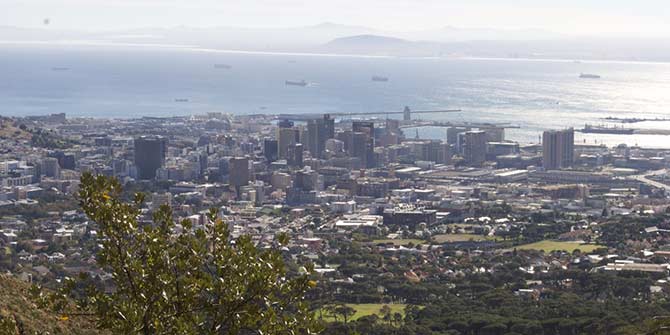Africa’s large infrastructure gap and heavy political economy element promotes significant government intervention in erstwhile free markets. It has become increasingly important to assess the efficacy of such government interventions. Following the “Bridging Africa’s Finance Gap” panel at the recently concluded LSE Africa Summit 2017, Stears assesses the welfare costs of government spending, drawing out implications for the cost of governance, crowding out, and social welfare.
In the beginning, there were markets. The process of buying and selling goods has served us well; most of what we own is the result of many markets working together to create a product. Consider the many markets involved in producing a simple cup of coffee, from Brazilian cocoa and sugar farmers to your Nescafe sachet.
Markets are a beautiful autonomous thing, but they often fail. As there is no inherent tendency for markets to create socially desirable outcomes, the most profitable level of production is not always what society requires. This is the case with affordable healthcare and education. With schooling, the social benefits exceed the profits made from private school fees. By not considering the advantages of an educated society, the market ‘underproduces’ schools. The market is unlikely to correct these failures and economic theory hands the baton to the government to fix.
More Than Intervening
In The Trouble with Nigeria, Chinua Achebe dedicated his final chapter to emulating Amino Kanu in asking a crucial question: “What is the purpose of political power?” Now, I add, “Why does your Governor want to lead?” Let’s assume that in Nigeria, our leaders intend to correct market failures. There is some evidence for this; the government provides a range of services, from military protection to public schools. Unfortunately, the road to inefficiency is paved with good intentions.
Markets are self-interested, so the government plays the role of promoting the common good, especially when it comes to redistribution. But the story doesn’t end when the government intervenes – the intervention must be done in a cost-effective way. Thus, we need to scrutinise government interventions when the markets fail, to ensure it leads to an improvement in welfare.
It is often difficult to measure the costs and benefits, but some examples can drive the debate. First, consider the cost of running a government. In 2015, Federal Government budgeted recurrent expenditure was ₦2.6tn, 60 per cent of the ₦4.49tn proposed budget. In the same year, roughly ₦19 billion was spent on roads. Kemi Adeosun compared this measly figure to the ₦64 billion spent on travel by public officials. When you consider the role corruption plays, it gets worse. The chances are that the roads did not cost as much as the budget states. Some corrupt inflating of costs would mean that the actual monetary value of the roads were less than ₦19 billion. The difference could be in a safe in Ikoyi.

There is a big question of getting value for money here. Departments and the government as a whole ought to ensure that salaries are justified with welfare benefits for the population.
More Than Financial Costs
The ‘costs’ of government intervention go deeper than monetary ones; there are significant welfare costs that cannot be easily measured but are arguably more important. What are the costs and benefits of the government clearing out slum dwellers for high valued land in Lekki? The potential social costs, which include higher crime rates and psychological harm, can outweigh the benefit of newly developed expensive apartments. Intervention is bound to create winners and losers, and if anyone should lose, it should not be the poor who were abandoned by the market in the first place.
Consider a final example – the recent Nigerian government borrowing spree. The benefits include the ability of the government to pursue many capital projects, which should have benefits today and in the future. But how about the costs? Firstly, government borrowing increases interest rates for the private sector and can crowd out private investment. If the FG is borrowing at around 10 per cent, private sector businesses will face higher rates as they are judged riskier than their respective governments. This contributes to the private sector finance gap in African countries. Secondly, there is the cost of future generations having to foot the bill for the debt we accumulate. It is crucial that we don’t borrow at levels that leave a huge burden for future governments to handle.
More Than a Budget
The bottom line is that we are arguably better off without a particular government action if its costs are greater than the benefits to society. The government is an expensive entity in charge of giving us a better hand than the market provides. And just like investors who scrutinise firms to lower costs, we must do the same. The current government has made some progress; the banning of some public officials from using first class and the pruning of ghost workers are some examples.
As always, there is room for improvement. Cost-effectiveness and value for money should be drilled into the objectives of every public official. Let’s do more than just making budgets and comparing the allocation of different sectors. What is the point of paying billions in salaries for public education when a governor visits a school only to find teachers missing from classrooms?
This article was first published on Stears Nigeria.
Tokunbo Afikuyomi Jr (@Teejay_A) holds a BSc degree in Economics and is currently an MSc Economics candidate at the LSE. With previous internships at Barclays and First Bank, Tokunbo is interested in monetary economics and central banking.
The views expressed in this post are those of the author and in no way reflect those of the Africa at LSE blog or the London School of Economics and Political Science.






2 Comments